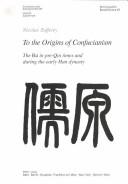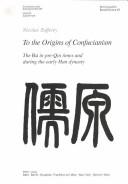| Listing 1 - 10 of 10 |
Sort by
|
Book
ISBN: 9782501055321 2501055322 Year: 2008 Publisher: [s.l.] : Marabout,
Abstract | Keywords | Export | Availability | Bookmark
 Loading...
Loading...Choose an application
- Reference Manager
- EndNote
- RefWorks (Direct export to RefWorks)
Confucianisme, taoïsme, bouddhisme, les Cent Écoles... La Chine a une pensée riche, originale et complexe, comme en atteste sa culture. Peut-être plus qu'ailleurs, en Chine ancienne comme dans la Chine contemporaine, l'histoire de la société et l'histoire des idées sont inséparables. Loin de notre philosophie occidentale et dépassant l'image traditionnelle qu'on en a, la pensée chinoise s'oriente surtout vers la résolution pratique des problèmes de la société, en partie parce que les grands lettrés ont joué un rôle fondamental et politique dans la société et auprès des plus puissants. Émaillé de nombreuses citations des principaux auteurs, cet ouvrage complet dévoile la profondeur et la complexité d'une tradition souvent méconnue et encore victime de clichés : il donne des repères pour explorer cet univers autre et fournit des clés pour trouver un juste milieu entre une vision moderne, qui fausse parfois les perspectives, et une vision traditionnelle, qui néglige l'importance de cette philosophie pour le monde d'aujourd'hui. Car connaître la pensée chinoise ancienne, c'est aussi mieux comprendre la Chine du XXIe siècle
China --- Chine --- Civilization --- History --- Religion --- Civilisation --- Histoire --- History.
Book
ISBN: 9782501078443 Year: 2008 Publisher: [Place of publication unknown] Marabout
Abstract | Keywords | Export | Availability | Bookmark
 Loading...
Loading...Choose an application
- Reference Manager
- EndNote
- RefWorks (Direct export to RefWorks)
S12/0220 --- China: Philosophy and Classics--History of Chinese philosophy: general --- Philosophy --- Comparative religion --- China

ISBN: 3906769909 0820459267 9783906769905 Year: 2003 Publisher: Bern ; New York : Peter Lang,
Abstract | Keywords | Export | Availability | Bookmark
 Loading...
Loading...Choose an application
- Reference Manager
- EndNote
- RefWorks (Direct export to RefWorks)
This book deals with the ru, a word too often understood as a reference to ‘Confucian literati‘. The study consists of two parts. In the first part the author discusses the problem of the origins of the ru and presents the main hypotheses offered by modern Chinese scholars in this respect. The second part examines the status and nature of a number of ru at a very important period in their history, namely the Qin dynasty and the early Han dynasty (3rd to 2nd centuries B.C.), with the interpretation of famous episodes such as the ‘execution of literati’ in 212, and the so-called ‘victory of Confucianism’ one century later.
Confucianism. --- China --- History

ISBN: 0820459267 Year: 2003 Publisher: Bern Lang
Abstract | Keywords | Export | Availability | Bookmark
 Loading...
Loading...Choose an application
- Reference Manager
- EndNote
- RefWorks (Direct export to RefWorks)
Book
ISBN: 2070746364 9782070746361 Year: 1997 Volume: 96 Publisher: Paris Gallimard
Abstract | Keywords | Export | Availability | Bookmark
 Loading...
Loading...Choose an application
- Reference Manager
- EndNote
- RefWorks (Direct export to RefWorks)
Book
ISBN: 2070338118 9782070338115 Year: 2006 Volume: 4393 Publisher: Paris Gallimard
Abstract | Keywords | Export | Availability | Bookmark
 Loading...
Loading...Choose an application
- Reference Manager
- EndNote
- RefWorks (Direct export to RefWorks)
Book
ISBN: 9782842793579 Year: 2007 Publisher: Paris You-Feng
Abstract | Keywords | Export | Availability | Bookmark
 Loading...
Loading...Choose an application
- Reference Manager
- EndNote
- RefWorks (Direct export to RefWorks)
Book
ISBN: 2842791452 9782842791452 Year: 2005 Publisher: Paris You-Feng
Abstract | Keywords | Export | Availability | Bookmark
 Loading...
Loading...Choose an application
- Reference Manager
- EndNote
- RefWorks (Direct export to RefWorks)
Chinois (langue) --- chinois (langue) --- Chinois (Langue) --- Manuels pour francophones. --- lexicologie --- manuel --- français (langue) --- vocabulaire --- répertoire --- S15/0610 --- China: Language--Grammar: baihua
Book
ISBN: 9782360570027 2360570021 Year: 2010 Publisher: Paris : L'Asiathèque-maison des langues du monde,
Abstract | Keywords | Export | Availability | Bookmark
 Loading...
Loading...Choose an application
- Reference Manager
- EndNote
- RefWorks (Direct export to RefWorks)
Chinois (langue) --- Chinois (langue) --- Chinois (langue) --- Manuels pour francophones. --- Glossaires, vocabulaires, etc.
Book

ISBN: 2850567817 2830602226 9782830602227 9782850567810 Year: 2004 Publisher: Genève Musées d'art et d'histoire
Abstract | Keywords | Export | Availability | Bookmark
 Loading...
Loading...Choose an application
- Reference Manager
- EndNote
- RefWorks (Direct export to RefWorks)
Art, Chinese --- Decorative arts --- Art --- Exhibitions --- S17/2101 --- S17/2116 --- S17/0400 --- China: Art and archaeology--Musea and exhibitions: Continental China --- China: Art and archaeology--Musea and exhibitions: Switzerland --- China: Art and archaeology--Chinese art: general and history --- Applied arts --- Art industries and trade --- Handicraft --- Art, Occidental --- Art, Visual --- Art, Western (Western countries) --- Arts, Fine --- Arts, Visual --- Fine arts --- Iconography --- Occidental art --- Visual arts --- Western art (Western countries) --- Arts --- Aesthetics --- Shanghai bo wu guan --- Musée de Shanghai --- Musée des beaux-arts de Shanghai --- Museo de Shanghai --- Museu de Xangai --- Shang hai bo wu guan --- Shang-hai po wu kuan --- Shanghai (China). --- Shanghai Museum --- Shanghai Museum of Art --- Shanghai shi bo wu guan --- Shanhai Hakubutsukan --- 上海博物舘 --- 上海博物館 --- 上海博物馆 --- Art, Primitive --- Art, Chinese - Exhibitions --- Decorative arts - China - Exhibitions --- Art - China - Shanghai - Exhibitions
| Listing 1 - 10 of 10 |
Sort by
|

 Search
Search Feedback
Feedback About UniCat
About UniCat  Help
Help News
News